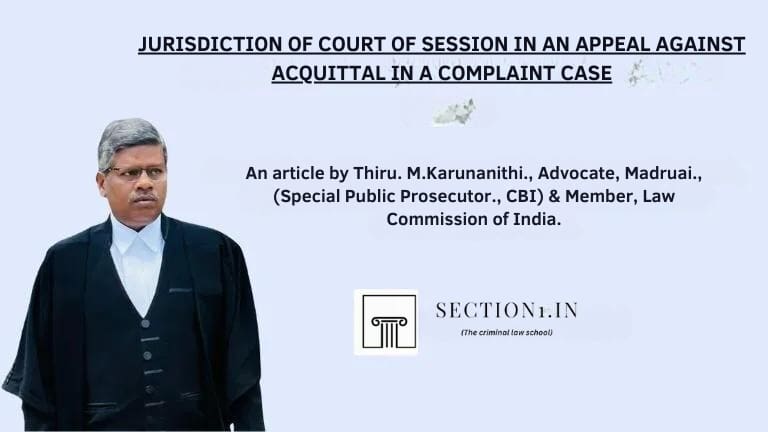JURISDICTION OF COURT OF SESSION IN AN APPEAL AGAINST ACQUITTAL IN A COMPLAINT CASE.
An appeal against acquittal has been provided in Section 378(1) to (6) of Code of Criminal Procedure. But there is no provision enabling the complainant to file an appeal against acquittal, but by invoking the Revisional Jurisdiction of the Hon’ble High Court conferred u/s. 397 and 401 of Code of Criminal Procedure, the Criminal Revision Cases have been filed so far by the defacto-complainant. Taking into consideration that there is no provision enabling the defacto-complainant to file an appeal against an unmerited acquittal, the Parliament inserted proviso clause to Section 372 of Cr.P.C. by the Act 5 of 2009 which came into force on 31.12.2009. Now the author intends to discuss the new provision insofar as it relates to a complaint case. In order to have better appreciation the relevant provision of law is extracted hereunder:
Chapter XXIX – Appeals – Section 372. No appeal to lie unless otherwise provided:
No appeal shall lie from any judgment or order of a Criminal Court except as provided for by this Code or by any other law for the time being in force: (Provided that the victim shall have a right to prefer an appeal against any order passed by the Court acquitting the accused or convicting for a lesser offence or imposing inadequate compensation, and such appeal shall lie to the Court to which an appeal ordinary lies against the order of conviction of such Court)
In a complaint case like complaint under Sections 138 r/w. 142 of Negotiable Instruments Act, if an order of acquittal is recorded whether an appeal would lie before the Court of Sessions or an appeal would lie before the Hon’ble High Court is the bigger issue. The various High Courts have taken different view. The Hon’ble Division Bench of Kerala High Court decided that an appeal against acquittal would lie only before the Hon’ble High Court and not before the Court of Sessions, by a reported judgment in 1[Omanajose and another Vs. State of Kerala and others] – .
_________________________________________________________________
1.2014(2) MWN (Cr) DCC 22
The similar issue has been elaborately dealt with by the Hon’ble Supreme Court reported in 2[Subhash Chand Vs. State (Delhi Administration)] –and the Hon’ble Madurai Bench of Madras High Court has also taken the similar view which is reported in 3[Selvaraj Vs. Venkatachalapathy] –.
In the above stated cases, the Hon’ble High Courts and Hon’ble Supreme Court of India, after thorough analysis of relevant provisions of Code of Criminal Procedure have come to conclusion and held that in a complaint case an appeal against acquittal would lie only before the Hon’ble High Court.
An appeal against acquittal has been provided in Section 378 of Criminal Procedure Code, the new proviso have been introduced in Section 372 Cr.P.C., taking into consideration of the fact that there is no appeal remedy for the defacto-complainant / victim.
Though the defacto-complainant in a case u/s. 138 of Negotiable Instruments Act will come under the definition of victim as defined in Section 2(wa) of Cr.P.C., still Section 372 Cr.P.C. is not intended for the complaint case for the simple reason that the proviso has been introduced only for the cases not covered u/s. 378 Cr.P.C. In order to appreciate the issue with true interpretation, Section 372 Cr.P.C. has to be read with heading. Chapter XXIX – Appeals – Section 372. No appeal to lie unless otherwise provided. Since no provision for complaint case to file an appeal against acquittal, new proviso has been inserted. Thus, if the defacto-complainant himself filed the complaint definitely an appeal would lie only before the Hon’ble High Court and not before the Court of Sessions. Because as per Section 378(4) Cr.P.C., Special leave to file an appeal has to be obtained. For better appreciation, Section 378(4) Cr.P.C. is extracted hereunder.
378(4) : If such an order of acquittal is passed in any case instituted upon compliant and the High Court on an application made to it by the complainant in this behalf, grants special leave to appeal from the order of acquittal, the complainant may present such an appeal to the High Court.
_________________________________________________________________
2. (2013) 2 SCC 17
3. 2014(2) TNLJ 153 (Criminal)
The relevant judgments are cited below
4[S. Ganapathy Vs N. Senthilvel] – It has been held as follows,
Para 31 – 31. Since, subsequent to the Full Bench reference, the Supreme Court in Satyapal Singh interpreted these provisions, we are duty bound to follow the same to the extent it binds us. With that in mind and in the light of the above legal precedents and the discussion, we answer the questions posed by the Referral Judge as follows:-
(1) A victim of the crime, who has prosecuted an accused by way of a private complaint, has a statutory right of appeal within the limits prescribed under Section 372 of Cr.P.C.
(2) A complainant (in a private complaint), who is not a victim, has a remedy and can file an appeal in the event of acquittal of the accused after obtaining leave to appeal under Section 378(4) of Cr.P.C (3) In a private complaint, even if the victim is not a complainant, he has a right to appeal under the proviso to Section 372 of Cr.P.C., but he has to seek leave as held by the Supreme Court in Satyapal Singh.
(4) The term ‘victim’ has been correctly interpreted by the Full Bench of the Delhi High Court in Ramphal and we are in agreement with the same.
(5) A victim (as defined under Section 2(wa) of the Cr.P.C does not cease to be a victim merely because he also happens to be a complainant and he can avail all the rights and privileges of a victim also and (6) The decision of the Single Judge in Selvaraj holding that the term ?victim found in Section 372 excludes a complainant, is not legally correct and in a given case, a complainant, who is also a victim, can avail right granted under Section 372 of Cr.P.C.
5[ Mallikarjun Kodagali Vs State of Karnataka and others] –
12. I am of the considered view that though the proviso to Section 372 of CrPC does give a right to the victim to file an appeal, this proviso cannot be read in isolation. It has to be given Crl. Appeal Nos._______/2018 (@ S.L.P. (Crl.) Nos. 7040-7041 of 2014) a meaning which fulfills the intention of the legislature. The proviso to section 372 of Cr.P.C does not lay down the procedure as to how, in what manner, and within which time the appeal has to be filed. An appeal, being a creature of the statute, it is also necessary to prescribe the limitation and procedure for filing the appeal.
6[ M.Venkatraman Vs DG.Bhaskaran ] –
4. 2016 (2) MWN Crl 321 (FB)
- 2018 (4) MLJ Crl 744 SC
- 2019 (3) MWN Crl (DCC 22) –
CONCLUSION :-
Thus, the irresistible conclusion is that the victim who is the defacto-complainant in a complaint case can file an appeal against acquittal only before the Hon’ble High Court, after getting special leave to file an appeal. Hence, the procedure adopted in some Sessions Court in entertaining appeal against acquittal in a complaint case is without jurisdiction till the decision of Hon’ble Madras High Court reported in 7[Selvaraj Vs. Venkatachalapathy] The above matter has been referred to full bench of Madras High Court and the Hon’ble Full Bench of Madras High Court has taken a view that an appeal against acquittal in complaint case would lie only before the court of session and the same has been reported in 2016(2) MWN (Crl) 321,
- 2014(2) TNLJ 153





